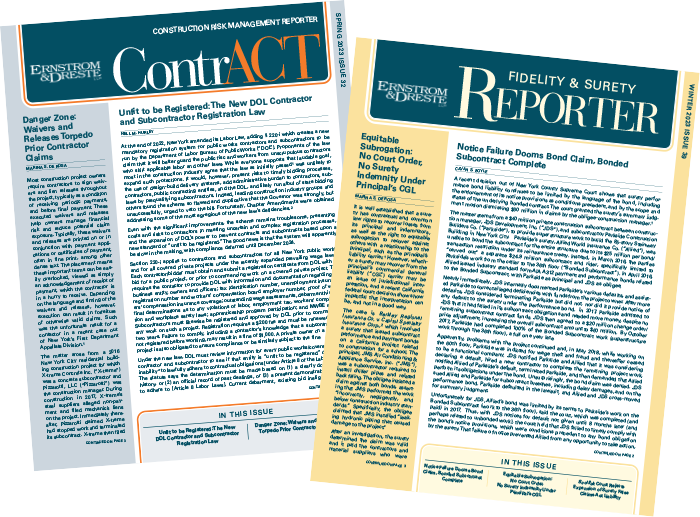Article by: Cavan S. Boyle
Last November, New York’s private Prompt Payment Act (“PPA”) for commercial construction projects of more than $150,000 was modified, making changes to General Business Law §§756-a and 756-c.1 Legislative sponsors sought to rectify the prior law’s failure to facilitate timely final payment to contractors or adequately limit retainage, which often subjected contractors (and subcontractors) to long wait-times for payment and caused costly, avoidable disputes.2 Thus, the new PPA provisions endeavor to reduce retainage and permit final invoicing earlier than previously provided. While industry leaders generally support the amendment, some predict the new law will not achieve the desired results or may create new problems. Others suggest parties can “contract around” the new requirements to avoid the law’s intended impact.
Section 756-c: Retainage Reduced to 5%
The amendment limits retainage for owners (and upstream contractors) to no more than 5% of the contract sum. Prior law authorized parties to agree on a “reasonable amount” of retainage (typically 10%). Subcontract retainage is also capped at 5% but in no case may it exceed that of the prime contract, as it was with the prior law.
Lower retainage is always better for the contractor’s cash-flow, though this reduction does not necessarily solve problems that can occur with various scenarios, such as retainage “bifurcation” where owners drop retainage to 0% halfway through the project, arguably preventing primes from withholding any retainage from later performing trades. This one example shows there may be a “learning curve” to these new mandates.
Section 756-a: Final Invoice Timing
The amendment also adds that “[a] contractor shall be entitled to submit a final invoice for payment in full upon reaching substantial completion, as such term is defined in the contract or as it is contemplated by the terms of the contract.” Final invoicing was previously permitted “upon the performance of all the contractor’s obligation[s] under the contract.”
In theory, submitting a “final invoice” earlier should get final payment, perhaps even retainage, to the contractor sooner. But will merely invoicing at “substantial completion” achieve this result? Not necessarily.3
First, because the statute does not define substantial completion, its occurrence is still determined by the contract, as the term is defined or “contemplated” therein. While some industry standard form contracts do reference a generally understood timing for substantial completion, revised forms and manuscripted documents often have terms defining (i.e. “contemplating”) that substantial and final completion can be nearly the same.4 Confusion and disputes will likely result because the contractual meaning of substantial completion may be unclear, particularly for subcontracts. The new law clearly invites parties to negotiate their own definition.5
Second, while the plain text of the amendment to §756-a provides for final invoicing at substantial completion, the existing text in §756-c states that retainage shall be released within 30 days of “final approval of the work”, possibly leaving open the question of whether an owner must, in fact, remit full payment at substantial completion. After all, under the PPA, payment for final invoicing remains subject to all the usual conditions of any payment application, such as incomplete, defective, or disputed work, failure to pay subs, lack of design professional or other certification, or any other failure to comply with contract provisions. Thus, final invoicing under this section is no guarantee of true final payment, or timing of that payment.6
As a result, final invoicing may be insufficient to obtain retainage at substantial completion.7 The requirement under GBL §756-c that retainage be released by the owner to the contractor within “30 days after final approval of the work” is unchanged. This appears to be the true deadline for final retainage, and it imposes interest at 1% per month on parties who fail to comply.
Finally, some posit that the PPA amendment only applies where the parties have not otherwise contracted, subject only to certain limited statutory exceptions.8 Submission of a final invoice and the amount of retainage are not among the exceptions. As such, these new PPA provisions may be superseded by negotiated contract terms, including different retainage amounts and/or payment terms. This interpretation could ultimately be decided by the courts.
For now, conformity with the new law is recommended, with careful contractor (and counsel) review of all contract language (both upstream and down) related to retainage, substantial completion, and conditions for final approval and final payment spelled out clearly. Strive for consistency of these terms across all contracts for the project to avoid confusion or surprises and expect a few bumps in the road.
- Certain private residential construction contacts are also impacted by the PPA. While not expressly stated, the monetary threshold is likely the total construction cost for the project, not individual subcontracts.
- The PPA is far from perfect and failed to operate as originally intended.
- Notably, an earlier version of the amendment required the release of retainage upon substantial completion. The final version did not.
- Standard AIA contracts, for example, often treat substantial completion synonymously with beneficial use/occupancy.
- Whether a prime contract’s definition of substantial completion governs subcontracts is unclear under this law, thus the statute’s language may leave that open to judicial or arbitral interpretation. An explicit negotiated term, however, should control.
- There is not even an explicit requirement for a punchlist to be generated as there is in the public Prompt Payment Law.
- Final invoicing under the new law would typically not include uncompleted/punchlist work, though might permit release of retainage for work completed, subject to final approval provisions.
- GBL §757 mandates certain “Void Provisions” that parties cannot modify by contract.




